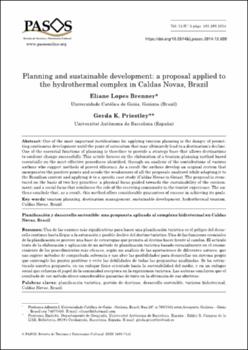Planning and sustainable development: a proposal applied to the hydrothermal complex in Caldas Novas, Brazil
Date
2014Abstract
One of the most important justifications for applying tourism planning is the danger of permit-
ting continuous development until the point of saturation that may ultimately lead to a destination’s decline.
One of the essential functions of planning is therefore to provide a strategy base that allows destinations
to confront change successfully. This article focuses on the elaboration of a tourism planning method based
essentially on the most effective procedures identified, through an analysis of the contributions of various
authors who suggest methods of proved efficiency. As a result the authors develop an original system that
incorporates the positive points and avoids the weaknesses of all the proposals analysed while adapting it to
the Brazilian context and applying it to a specific case study (Caldas Novas in Goias). The proposal is struc-
tured on the basis of two key priorities: a physical focus guided towards the sustainability of the environ-
ment; and a social focus that reinforces the role of the receiving community in the tourist experience. The au-
thors conclude that, as a result, this method offers considerable guarantees of success in achieving its goals. Una de las razones más significativas para hacer una planificación turística es el peligro del desar-
rollo continuo hasta llegar a la saturación y posible declive del destino turístico. Una de las funciones esenciales de la planificación es proveer una base de estrategias que permita al destino hacer frente al cambio. El artículo trata de la elaboración y aplicación de un método de planificación turística basado esencialmente en el reconocimiento de los procedimientos más eficaces, según un análisis de las aportaciones de diferentes autores, que
nos sugiere métodos de comprobada solvencia y nos abre las posibilidades para desarrollar un sistema propio que contemple los puntos positivos y evite las debilidades de todas las propuestas analizadas. Se ha estructurado nuestra propuesta, en un enfoque físico orientado hacia la sostenibilidad del medio, y en un enfoque social que refuerza el papel de la comunidad receptora en la experiencia turística. Las autoras concluyen que el
resultado de ese método ofrece considerables garantías de éxito en la obtención de sus objetivos.





